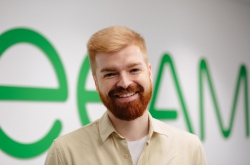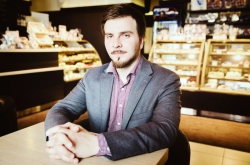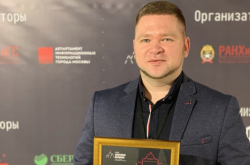The idea to develop a student-driven site came in the early 2000’s. How did it start?
As with many such projects, the idea was spontaneous. Students have lots of plans, energy and inspiration. Back then the university already had an official site - ifmo.ru - which corresponded with the English abbreviation of its name - Institute of Fine Mechanics and Optics. The university had a developed infrastructure and intranet.
But students always want something personal that would interest their friends and group mates. Back then we didn’t have Facebook or Vkontakte. So students communicated on various forums and sites.
There the students of technical departments had an advantage because they could program. They could create a site or a forum or a portal, which is what my older friends did. By 2001 they were eager to move to other things, and I was invited to take over.

As I started working on the site, I was inspired by new people: students from completely different departments were registering, connecting on the forum, sharing materials and ideas. We also met offline and had a great time. Over time, the student community became the foundation of the project.
So the site was built from scratch? How did it develop?
Yes, everything was written from scratch, except for the forum. We used a standard forum engine. In general, like any noncommercial project, the site developed ad hoc, when there was free time. The technical side and all the programming was mostly on me, but the content was sent to us. And at some point I made it possible for users to add files directly on the site with subsequent moderation.
It should be noted that the site was originally called "The Seventh Bit". It was correlated with the topics that the students studied in our department. We could have called it “The Eight Bit,” as in a full byte. But, on the other hand, the bit numbering in the byte starts from zero, and the number "seven" is marked with the eighth bit. So there are different ways to interpret the name.
The name was suggested by the founders and I wanted to keep it. After moving the site to commercial hosting, I bought the name bit7.ru. After a while, I also decided to buy itmo.ru, which was vacant at the time. The university wasn’t interested in it as it didn’t meet its objectives at the time.

Back then there was no developed system for online payments, so when I noticed that the domain name was vacant, I actually went to Sberbank, stood in line and got the registration in a few days. At the time, ITMO abbreviation in Latin wasn’t official. So I decided that since “The Seventh Bit” was also an unofficial portal for ITMO students, the two portals should mirror each.
At the time we didn’t know that “Information Technologies” would become part of the university's official name. I was very glad that our site had a name to be proud of. At the same time, it was easy to remember and associated with the university.
In the late 1990’s, the university was beefing up IT education and by 2004, our team was the world champions in programming for the first time. Could you imagine that the university would later become one of the leaders in Computer Science?
Back when I was studying I already felt that the university was strong at teaching programming. I really wanted to become a specialist in the field of information technology, and had no doubt that the University was strong in this field. Even at the beginning of this century it was clear that this is one of the best universities in Russia. And subsequently ITMO University only got better.
In my opinion, the fact that last year the University’s team became seven-time world champions in programming shows that the training system is effective and consistent, that kind of success is not random. This means that the system works from year to year and well, making it possible to achieve results with new teams of students. Now, at the University, previous winners of prestigious competitions teach the next generation, which also indicates the quality of the Department and the University as a whole.

Have you kept up with the university’s news since you graduated?
Of course, I am keeping up with the news and the fate of the university. I was excited to find out that the university achieved the status of a National Research University. This truly shows the prestige of the university since not all Russian universities achieve this status. This makes me proud as a graduate. I am proud that I finished my PhD at this university, and I’m proud of my department, and especially grateful to my supervisor Professor Alexander Tropchenko, for both my Masters and PhD. Moreover, after my studies, I’m happy to see that the university’s management is very attentive towards the students. Now they can develop in many different way, play sports and explore their creativity and this is very important.
In your opinion, in your current work, have you embodied those plans, and dreams that you had while you were still at university?
From the 7th grade I wanted to be a programmer, even though there were no such opportunities for classes on programming which are currently available. The types of computers available now were not available then, the computing tools were much more primitive. However, even then I realized that I was interested in creating something of my own in this area: to write programs that can later be popular with users, to solve their problems.
Now I’m working with megagroup.ru, a large company that specialized in producing websites, works with the Russian market and CIS countries. I lead a group of 12 people within a large R&D department. We are working on writing and developing CRM systems, analysing business processes, collecting and processing large volumes of production data, studying where and which workflows are not implemented properly in terms of productivity and cost and thus can be improved in the future.

Any manufacturing, especially when it employs 500 people, and these are only employees, not counting customers, whose number exceeds 60 thousand, requires systems that allow people to comfortably and accurately build a workflow. These systems will tell implementers at what stage and exactly what needs to be done, and will help managers monitor the work of their department. Automating production and business processes is very much in demand today, as it allows to significantly reduce costs for companies, as well as to improve the quality of service and products.
So you must be now applying more managerial skills, not just programming skills.
In this regard, I really like one unusual comparison: the programmer, if he is engaged exclusively in programming in a run of the mill position, then his retirement age will be something like a ballerina, about 37 years old. That might sound a little exaggerated, but nevertheless, at this age it is very difficult to compete with young graduates in our field. Why? Because the knowledge and skills that were acquired a decade ago, now at least half of them are outdated. Some of the technology that we used when creating “the Seventh Bit” website were completely different, they are practically nothing like the ones we use now. These are completely different approaches, a different programming methodology.
At 25 years old and at 35 years old, people are in unequal conditions, but at 35 you can usually take on a leadership role and expand your skills. Experience of consolidating and building a team, vision of a project goal and having the ability to set tasks, in turn, is not related to time. You can apply these skills and feel comfortable at 35 and at 40 years old, and at an even older age.

Naturally, as you said, technology is changing. The needs of the target audience are also changing. What, in your opinion, should a modern website of a leading university do to meet the needs of users?
This is a very good question. As a user and as a person with technical education, I would like the website to help solve specific problems, to provide content in the fastest and most convenient form. An applicant should be able to access all the information about departments, the structure of education, alumni reviews, campus photos and videos of lectures to form a clear opinion of whether what the university is offering meets current job market conditions, including on the international level.
At the same time, students need help solving ongoing tasks, such as providing access to education materials and facilitating communication with instructors, including submitting work electronically. Most instructors already integrate it into their courses. When we were students, we had to hand everything in.
For me a good modern website is a resource that offers both information and opportunities. It’s an action-site. Interactivity is also a vital component. The site needs to adapt to its users, considering their goals and needs and forming useful content for each person.
ITMO University would like to express its gratitude to Alumni Association and Endowment Fund for their support of the domain transfer. As part of ITMO University's development strategy, domain ifmo.ru will move to itmo.ru by 2020. Currently itmo.ru mirrors ifmo.ru.





